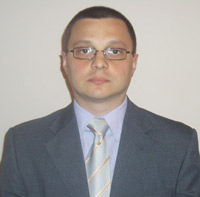
Nume: NISTOR Ionut
Tema: Discurs literar-artistic şi construcţie identitară în secolele XVI-XX
Partener: Academia Română, Filiala Iaşi Institutul de Istorie A.D. Xenopol, Iaşi
Proiect: Romania si aromanii din Balcani in timpul celor doua razboaie mondiale. Discurs politic si constructie identitara.
Date de contact:
Inistor2001@yahoo.com
Profil
Experienţa profesională
- perioada 2007-prezent: asistent universitar;
- activităţi şi responsabilităţi principale: seminarii şi cursuri;
- numele şi adresa angajatorului: Universitatea "Alexandru Ioan Cuza" Iaşi, bd. Carol, nr. 11;
- tipul activităţii sau sectorul de activitate: învăţământ
Educaţie şi formare
- perioada 2003-2007: Doctor în istorie;
- disciplinele principale studiate / competenţe profesionale dobândite: istorie
- numele şi tipul instituţiei de învăţământ / furnizorului de formare: Universitatea „Alexandru Ioan Cuza” Iaşi, Facultatea de Istorie
- perioada 2002-2003: Studii aprofundate "Românii în relaţiile internaţionale
- disciplinele principale studiate / competenţe profesionale dobândite: istorie
- numele şi tipul instituţiei de învăţământ / furnizorului de formare: Universitatea "Alexandru Ioan Cuza" Iaşi, Facultatea de Istorie
Aptitudini, competenţe personale şi abilităţi sociale comunicare
- limbi cunoscute: franceza, engleza
- sociabilitate
- bilităţi în organizarea şi coordonarea manifestărilor ştiinţifice
- Certificat de competenţă a utilizării tehnologiei informatice Blackboard în urma programului de pregătire a instructorilor „Blackboard Learning System Essentials Workshop”, Iaşi, mai 2007
Romania si aromanii din Balcani in timpul celor doua razboaie mondiale. Discurs politic si constructie identitara.
By this project we propose to study in a comparable way, the evolution of Macedo-Romanian community during the two world wars, the way that the Macedo-Romanians had reported to the own identity, were redefined as an ethnic community and they have adapted to the geopolitical changes. Also, we are interesting in a reasoned response to the dilemma: Macedo-Romanian "community" or "communities" (dilemma caused by reading of several testimonies of Romanian travelers in the Balkan space in the beginning of XXth century, which underlines major differences between the Macedo-Romanian groups, both in terms of language and of adhesion to the culture and the Romanian values. Starting from this problem, we will try to analyze the perspective differences (political, cultural, religious) between the Macedo-Romanian groups, but also the education system well-funded in Bucarest and the Romanian authorities’ intention to rule and standard in “Romanian” way the Macedo-Romanian education. Obviously, this approach is one aspect of the comprehensive theme circumscribed to the reconstitutf effort applied to the Macedo-Romanian groups outside the Romanian State, during the references period, but our attention will not stop only for contextualization and comparison to the communities from Timoc or north of Bulgaria.
The analysis of Macedo-Romanian development, reconstruction, remodeling and redefining identity will have, therefore, both an "internal" perspective, by reference to the processes occurring the South-Danubean community, and a "foreign" perspective, by detection of the role the Romanian state had in structuring identity and creating a "cultural program" in the Balkans. Also, setting these time frames for our research ensures originality and offers the oportunities for an analysis which enhance sources unexploited. The two world wars meant to the Macedo-Romanians periods which pressure from host states and the denationalization proces were more intense and Romanian state reactions were crucial for maintaining or altering unit this Balkan group.
Lucrări reprezentative
Autor:
- Problema aromână în raporturile României cu statele balcanice 1903-1913 , Edit. Universităţii „Alexandru Ioan Cuza”, Iaşi, 2009, p. 305, ISBN 978-973-703-453-3.
- Coordonator (alături de Paul Nistor) al volumului Relaţii internaţionale. Lumea diplomaţiei – lumea conflictului, Edit. PIM, Iaşi, 2009, ISBN 978-606-520-359-4.
Coautor:
- Istoria Universităţii din Iaşi, Alexandru Florin Platon, Gheorghe Iacob (coord.), Iaşi, Editura Universităţii „Alexandru Ioan Cuza”, 2010, 905 p., ISBN 978-973-703-599-8 cu capitolele Aniversarea semicentenarului (1911) p. 259-269, Universitatea în anii celui de-al doilea război mondial şi în primii ani postbelici (Activitatea didactică şi ştiinţifică) p. 487-493, Baza materială a Universităţii p. 505-509, Epurările p. 517-522), Universitatea în timpul regimului comunist (Activitatea didactică şi ştiinţifică p. 549-579, Baza materială a Universităţii p. 595-601), Universitatea în perioada 1989-2009 p. 653-686.
Studii şi articole:
- Sistemul şcolar românesc din Macedonia în anii celui de-al doilea război mondial, în Românii din afara graniţelor ţării. Europa de lângă noi. Identitate şi multiculturalitate în Bucovina istorică, volum coordonat de Mircea-Cristian Ghenghea, Iaşi, Casa Editorială Demiurg, 2010, p. 123-130 ISBN 973-152-181-7.
- România, problema aromână şi crearea statului albanez (1912-1913) , în Studii de istorie a românilor şi a relaţiilor internaţionale, editori Lucian Leuştean, Petronel Zahariuc, Editura Universităţii Alexandru Ioan Cuza Iaşi, 2008 ISBN 978-973-703-287-4.